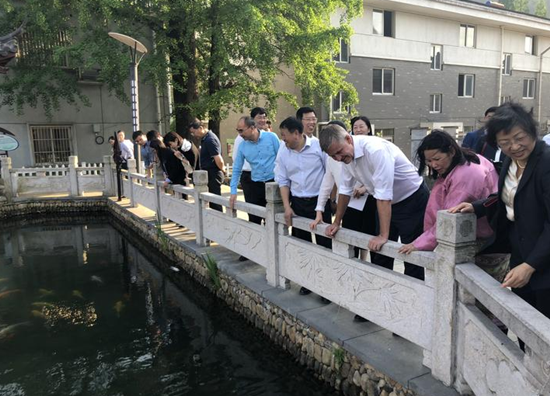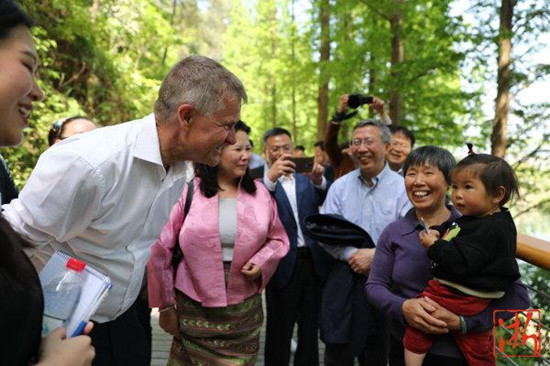UN official commends Zhejiang's efforts in ecological protection

Erik Solheim takes a close look at the river in Anji county, Zhejiang province on April 19. [Photo/zjol.com.cn]
Erik Solheim, executive director of the United Nations Environment Program (UNEP), gained a deeper understanding of environmental protection efforts in East China's Zhejiang province after a three-day trip from April 18 to 20.
Curious about how to achieve a balance between economic growth and ecological conservation in Zhejiang, one of China's most prosperous provinces, Solheim visited Pujiang county, Anji county and Hangzhou West Lake scenic area for answers.
In Pujiang, the first target of Zhejiang's "Water Movement", launched in June 2013, Solheim was briefed on the changes that the anti-pollution campaign has brought to the county.
There used to be 22,000 companies in Zhejiang churning out 85 percent of the world's hot fix crystal glassware. By 2013, Pujiang was the most polluted county in China, due to the devastating pollution caused by this industry. More than 500 of its water sources were milk-white, while another 25 had turned black. Today, Pujiang's environment has drastically improved by shutting down outdated workshops and treating waste water efficiently.
Zhang Shuqi, a female Pujiang native, shared with Solheim her joy at the cleaner environment, saying that the corridor along the Puyang River, now with clean water and green mountains, has become a great place for walking.
Yucun village, Anji county, Huzhou is where the "Two Mountains" theory – "Lucid waters and lush mountains are invaluable assets" – originated. There, Solheim got an intimate look at the village's transformation.
After hearing about the dilemma Yucun once faced, Solheim said many countries face similar problems when seeking a balance between economic development and environmental protection. He agreed with the "Two Mountains" theory and highly praised the green development path Yucun has chosen.
"In 2017, over 500,000 tourists visited Yucun, bringing in a total revenue of more than 30 million yuan ($4.75 million)," said Yu Xiaoping, Party chief of the village.
"This method of green development is quite dynamic," Solheim said, impressed by the numbers.
The West Lake is a one of the most famous landmarks in Hangzhou, capital of Zhejiang province. It's been 33 years since Solheim last visited the scenic area in 1985. "It has become bigger and more beautiful," the UN official said on April 20.
Weng Wenjie, director of the management committee of the scenic area and river chief of the water area, demonstrated their water purifying technology to Solheim. Walking along the lake, Solheim was amazed at the underwater wood which reduces suspended solids, purifies the water and releases oxygen for microorganisms.
"Zhejiang has abundant experience in water treatment," Solheim said, "The river chief mechanism regulates the rights and responsibilities of river chiefs in cleaning up and protecting water resources, which can serve as an example to other countries."

Erik Solheim talks to a local villager in Pujiang county, Zhejiang province on April 18. [Photo/zjol.com.cn]

 Print
Print Mail
Mail
 20 Cultural Symbols
20 Cultural Symbols Why Zhejiang
Why Zhejiang Experiencing high-tech products at WIC
Experiencing high-tech products at WIC Zhejiang Release
Zhejiang Release Zhejiang News
Zhejiang News